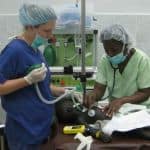Partnering to Provide Safe Surgery
Smile Train, Lifebox helping equip health care facilities
Five billion people worldwide lack access to safe surgery and anesthesia, according to The Lancet, causing millions to die each year from common, otherwise treatable conditions. In fact, the risk of dying from a life-saving procedure in low-resource settings is up to 1,000 times higher than in the U.S.
Vast, unmet gaps in access to safe surgical care should be addressed. Insufficient supply of trained professionals, combined with weak hospital infrastructures and systems required to support safe surgery, are among the deep-seated challenges threatening surgical outcomes in the world’s poorest regions.
One major risk for surgery patients in resource-starved settings is inadequate oxygen monitoring – critical to ensuring safe use of anesthesia. Without this necessary tool, patients can experience undetected hypoxia, complications and, too often, death. In 2010, around 77,000 operating rooms worldwide did not have access to pulse oximetry, equipment that non-invasively monitors blood oxygen levels during surgery.
Technology that ensures safe surgical outcomes should be a standard part of the global health care system. In its absence, families, communities and even the health care workers who are unable to deliver the proper standard of care will continue to suffer from devastating outcomes that are often avoidable. Inadequate technology also causes severe economic repercussions: High rates of disability and premature death stifle the creation of a full, productive workforce, inhibiting economic productivity and compromising the growth and progression of entire regions.
To identify meaningful solutions to these vital challenges, we should combine essential surgical technologies with a nuanced, community-based approach to health care. Achieving positive surgical outcomes requires investing in resilient and, ultimately, self-sustainable health systems in the world’s most vulnerable places. Scalable, long-term solutions – not temporary fixes – are needed to advance the goal of giving every patient, anywhere in the world, the promise of safe, high-quality surgical care.
Training local health workers is a necessary first step. Empowering medical professionals with the training and resources they need to perform safe surgery in their own communities allows patients to be reached more safely, quickly and efficiently. It helps address low-income regions’ complex health needs by multiplying the number of skilled surgeons and health providers equipped to perform essential procedures, address unexpected challenges and save lives. In the long term, training and empowering medical professionals lays the groundwork for sustainable health care systems and effective protocols for ensuring safe surgical outcomes, positively influencing entire populations for generations to come.
Even relatively minor surgeries can have big economic implications. A recent study published in the World Journal of Surgery shows that for every $250 invested in corrective surgery for cleft lip or palate – a debilitating condition impacting millions of children in the developing world – as much as $50,000 is put back into the local economy, as patients go on to contribute to the economy and have the opportunity to lead full, productive lives. This amounts to a return on investment of 200 times. The study, featuring global data from Smile Train (where co-author Susannah Schaefer is CEO), found that the total economic impact achieved from their cleft repair surgeries amounts to as much as $20 billion.
Taking steps toward a healthier, more productive population requires combining multiple perspectives, areas of expertise and forward-thinking ideas. In this spirit, Smile Train, the world’s largest cleft charity, and Lifebox (where co-author Pauline Philip is CEO), the leading NGO dedicated to safe surgery, have partnered to bring safe surgical care to hospitals across the world.
Lifebox developed a pulse oximeter for challenging hospital environments – rechargeable and available as part of a multi-language training program – that alerts medical professionals to an unsafe drop in a patient’s blood oxygen level during surgery. Since its founding in 2011 by four of the world’s leading medical organizations, Lifebox has distributed more than 11,000 oximeters in over 100 countries, reaching about 10 million patients. Lifebox’s oximeters sustainably improve the quality of surgical care at under-resourced facilities for only $250 each.
For its part, Smile Train’s medical partners have performed more than 1 million free cleft repair surgeries in developing countries, where operating rooms are most likely to be under-supplied. Instead of flying in western doctors, Smile Train provides training and resources to support local medical professionals and fortify local health care facilities.
Smile Train and Lifebox began working together in 2011, when Smile Train made a significant contribution to Lifebox for the donation of 2,200 pulse oximeters. Smile Train distributes oximeters from Lifebox to their local partners to enhance the safety of cleft repair surgeries and elevate the standard of care across global surgical centers at large. Together, Smile Train and Lifebox work to equip local health care facilities with the resources, training and technology necessary to make surgery safer.
Looking ahead, Lifebox is working to establish a set of standards aimed at reducing rates of surgical infection through its Clean Cut Program, which focuses on simple, scalable global interventions that elevate the quality of surgical care in regions where it’s needed most.
But we still have a long road ahead of us. We must invest in local communities to make safe surgical tools and protocols a deeply ingrained component of all surgical care. Governments, health care organizations, NGOs and health advocates must work together to identify meaningful solutions that advance the delivery of safe surgical care everywhere in the world. After all, safe surgical protocols not only improve outcomes and save lives, but positively impact entire communities and regions at large. They hold the key to a more resilient and prosperous global community.
Susannah Schaefer is the executive vice chair and chief executive officer of Smile Train, and Pauline Philip is the honorary CEO of Lifebox Foundation.
Pulse oximeter photo courtesy of Lifebox.
- Categories
- Health Care



